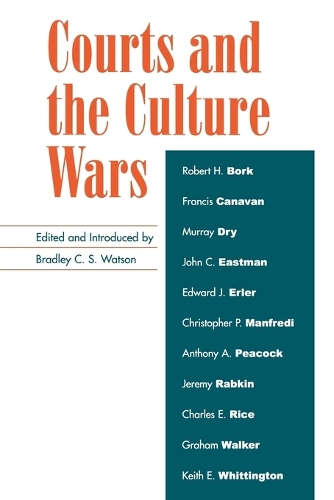
Courts and the Culture Wars
(Paperback)
Publishing Details
Courts and the Culture Wars
By (Author) Bradley C. S. Watson
Contributions by Robert H. Bork
Contributions by Francis Canavan
Contributions by Murray Dry
Contributions by John C. Eastman
Contributions by Edward J. Erler
Contributions by Christopher P. Manfredi
Contributions by Anthony A. Peacock
Contributions by Jeremy Rabkin
Contributions by Charles E. Rice
Bloomsbury Publishing PLC
Lexington Books
6th September 2002
United States
Classifications
Tertiary Education
Non Fiction
Legal systems: courts and procedures
Constitutional and administrative law: general
347.7312
Physical Properties
Paperback
236
Width 151mm, Height 228mm, Spine 18mm
358g
Description
For much of the second half of the 20th century, America's courts - state and federal - have injected themselves into what many critics consider to be fundamentally moral or political disputes. By constitutionalizing these disputes courts have arguably reduced the ability of Americans to engage in traditional, political modes of settling differences. While legal discourse is well-suited to choosing decisive winners and losers, political discourse is perhaps more conducive to reasonable compromise and accommodation. This text brings together some of America's thinkers in constitutional theory and practice to consider the impact of judicial engagement in the moral, religious and cultural realms - including school prayer, abortion, homosexual rights, and expressive speech - and the threat the judiciary poses to the very legitimacy of the American republican regime.
Reviews
Courts and the Culture Wars casts a spotlight on the role that judges and lawyers have played in undercutting Americans' ability to have a say in setting the conditions under which they live, work and raise their children. These essays by some of the nation's most forthright social critics are lively, provocative, and sobering. -- Mary Ann Glendon, Learned Hand Professor of Law, Harvard University, former U.S. Ambassador to the Holy See
Author Bio
Bradley C. S. Watson is Associate Professor of Political Science and Fellow in Politics and Culture in the Center for Economic and Policy Education at Saint Vincent College. He is the author of Civil Rights and the Paradox of Liberal Democracy, (Lexington Books, 1999).
